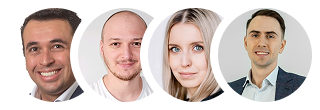How to make your project a fun hobby that pays you - Mariia Lukianova
.png)
Mariia Lukianova, mentor 12BRAVE: “Make your project a fun hobby that pays you”
Could you tell us a bit about your professional background?
Honestly, I dislike this question because I have several professional backgrounds. I did my Master’s in chemical engineering and worked in R&D at Electrolux for six years. It’s a huge transnational corporation that makes domestic appliances for millions of households.
At the same time, I was involved in corporate social responsibility projects. For instance, the Electrolux Food Foundation, where we taught people how to use food more sustainably, reduce waste, save money, and even donate to charity. It felt meaningful on many levels.
I was always running side projects. I’ve never liked the slow pace of corporate processes — I’m naturally fast, and corporations move painfully slow. So while working full-time, I used evenings and weekends for extra projects.
One of my first side projects started while I was stuck on a corporate assignment. I was following a brilliant creative director in London, and she happened to be looking for a part-time assistant.
I thought, why not? I can write emails. So I reached out, and we worked together for about six months — me from Russia, her in London. Later she launched her own academy for creative careers, and since I knew the process from day zero, I became executive director.
What began as a small side gig turned into a full second career — with income, growth, and connections.
Was there a moment when your focus shifted in a new direction?
After February 2022, Electrolux left Russia, and so did I. I moved first to Georgia and switched to a career in charity. My management background allowed me to build systems that made the help more structured and sustainable.
That’s how I got into working with different models of monetization for initiatives. Over the past two years, we’ve managed to make three initiatives helping refugees, women, and children in Georgia. Some of it was pure luck, some of it perseverance, some of it just fueled by coffee and anger. But it worked. Now I mainly fundraise for startups — VC funding, Kickstarter campaigns and such.
You’ve also been a mentor at 12BRAVE. Why did you join?
It was a fun chance to talk about launching side projects. I’ve been doing what’s now called a “slash career” — engineer slash PR-manager/fundraiser slash director — for years before it was cool.
Also, my experience is relevant for people starting from zero. In grassroots startups, you often work with no budget, no big name behind you, only an idea, motivation, and time. That’s closer to reality for most side hustlers than advice from someone used to million-dollar budgets.
What do you hope participants remembered from your session?
To have fun! Starting a project can be disappointing — like launching a website and expecting a flood of customers, but nothing happens. If you treat it too seriously, you’ll quit.
But if you find ways to enjoy it — putting funny stickers around your block, chatting with baristas at your favorite coffee shop — you’ll keep coming back. Like sports: if you hate CrossFit, you won’t return. But if you enjoy yoga, you’ll keep practicing. Make your project a fun hobby that pays you, not a dreadful responsibility.
How do programs like 12BRAVE influence careers?
They create something more valuable: a lab. You’re surrounded by people in the same situation, you share ideas, test them, nurture them, and by the end you have something real — not just theory, but a tangible result.
Because you’ve invested 12 weeks, it’s harder to drop it. You’re engaged, you’ve had fun, and you end up with something you can actually use. That’s the real value.
Looking back, what were the biggest professional insights for you?
At the start of my career, I thought the hardest challenges in work to be technical. But actually, the hardest part everywhere — startups, corporations, side projects — is communication.
I’ve seen disasters happen simply because people didn’t say what they needed at the right time. If I had to choose between a top-notch technical expert with poor communication skills, or an average professional with excellent soft skills, I’d choose the second every time. Communication moves projects forward.
So my advice: if you want to stay competitive, work on communication. Even in today’s economic mess, if you can prove strong soft skills with recommendations and a track record, you’ll be in high demand.
Many professionals now combine corporate jobs with side projects. Do you see this trend?
It’s understandable. Life has become incredibly expensive. Real estate, rent, taxes, trade wars — salaries just can’t keep up. It’s expensive to be an adult.
If you have only one source of income and you lose it, it may take six to eight months to find another job — if you’re lucky. So people diversify. It’s common sense. I’d personally prefer one job, not four, but this is the reality.
What would you recommend to someone who has an idea but is too scared to start?
First, be realistic about your fears. Some are valid — for example, you may be contractually restricted by your employer. Check that before you act.
Other fears are psychological: fear of overload, or of what people will think. Having “Engineer at Apple” on your business card gives you a certain status. Doing your own thing may feel less prestigious. But does it really matter what others think? Write your fears down, look at them on paper. Some will turn out not so scary; others might be — in which case, maybe it’s not the right time.
Many people give up when things get hard. What helps you push through?
For me it’s responsibility. With startups without funding, the whole team goes down. Knowing that my work directly impacts people’s survival — that keeps me going.




